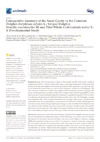Identificador persistente para citar o vincular este elemento:
https://accedacris.ulpgc.es/jspui/handle/10553/77839
| Campo DC | Valor | idioma |
|---|---|---|
| dc.contributor.author | García de los Ríos y Loshuertos, Alvaro | en_US |
| dc.contributor.author | Soler Laguía, Marta | en_US |
| dc.contributor.author | Arencibia Espinosa, Alberto | en_US |
| dc.contributor.author | López Fernández, Alfredo | en_US |
| dc.contributor.author | Covelo Figueiredo, Pablo | en_US |
| dc.contributor.author | Martínez Gomariz, Francisco | en_US |
| dc.contributor.author | Sánchez Collado, Cayetano | en_US |
| dc.contributor.author | García Carrillo, Nuria | en_US |
| dc.contributor.author | Ramírez Zarzosa, Gregorio | en_US |
| dc.date.accessioned | 2021-02-24T15:25:46Z | - |
| dc.date.available | 2021-02-24T15:25:46Z | - |
| dc.date.issued | 2021 | en_US |
| dc.identifier.issn | 2076-2615 | en_US |
| dc.identifier.other | Scopus | - |
| dc.identifier.uri | https://accedacris.ulpgc.es/handle/10553/77839 | - |
| dc.description.abstract | Our goal was to analyze the main anatomical structures of the dolphin external nose and nasal cavity from fetal developmental stages to adult. Endoscopy was used to study the common development of the external nose and the melon, and nasal mucosa. Magnetic resonance imaging (MRI) and anatomical sections were correlated with anatomical sections. Computed tomography (CT) was used to generate 3D reconstructions of the nasal bones and nasal cavities to study its development. Dissections, histological and pathological studies were carried out on the nasal mucosa to understand its function. These results were compared with the horse. Endoscopy showed an external nose with two lips and the upper lip is divided by a groove due to the nasal septum and an obstruction of right nasal cavity was diagnosed in a newborn. Two diverticula (air sacs) were found in the nasal vestibule and an incisive recess (premaxillary sac) in the nasal cavity. These findings were corroborated by 3D reconstructions of the nasal cavities, MRI, anatomical sections and dissections. The presphenoid and ethmoid bones were fused at early stages of fetal development. The ethmoid is the last bone to ossify in the nasal cavity. | en_US |
| dc.language | eng | en_US |
| dc.relation.ispartof | Animals | en_US |
| dc.source | Animals [EISSN 2076-2615], v. 11 (2), 441, (Febrero 2021) | en_US |
| dc.subject | 3105 Peces y fauna silvestre | en_US |
| dc.subject | 240119 Zoología marina | en_US |
| dc.subject | 240101 Anatomía animal | en_US |
| dc.subject.other | 3D Reconstruction | en_US |
| dc.subject.other | Common Dolphin (Delphinus Delphis) | en_US |
| dc.subject.other | Dissection | en_US |
| dc.subject.other | Endoscopy | en_US |
| dc.subject.other | Fetal Development | en_US |
| dc.subject.other | Histology | en_US |
| dc.subject.other | MRI | en_US |
| dc.subject.other | Nasal Cavity | en_US |
| dc.subject.other | Nose | en_US |
| dc.subject.other | Ontogeny | en_US |
| dc.subject.other | PET/SPECT/CT | en_US |
| dc.subject.other | Pilot Whale (Globocephala Melas) | en_US |
| dc.subject.other | Sectional Anatomy | en_US |
| dc.subject.other | Striped Dolphin (Stenella Coeruleoalba) | en_US |
| dc.title | Comparative anatomy of the nasal cavity in the common dolphin delphinus delphis l., striped dolphin stenella coeruleoalba m. and pilot whale globicephala melas T.: A developmental study | en_US |
| dc.type | info:eu-repo/semantics/Article | en_US |
| dc.type | Article | en_US |
| dc.identifier.doi | 10.3390/ani11020441 | en_US |
| dc.identifier.scopus | 85100590676 | - |
| dc.contributor.authorscopusid | 57221920359 | - |
| dc.contributor.authorscopusid | 57221904906 | - |
| dc.contributor.authorscopusid | 57221918698 | - |
| dc.contributor.authorscopusid | 57221914202 | - |
| dc.contributor.authorscopusid | 57221910219 | - |
| dc.contributor.authorscopusid | 6505981826 | - |
| dc.contributor.authorscopusid | 6504668945 | - |
| dc.contributor.authorscopusid | 57188634860 | - |
| dc.contributor.authorscopusid | 6602694649 | - |
| dc.identifier.eissn | 2076-2615 | - |
| dc.description.lastpage | 37 | en_US |
| dc.identifier.issue | 2 | - |
| dc.description.firstpage | 1 | en_US |
| dc.relation.volume | 11 | en_US |
| dc.investigacion | Ciencias de la Salud | en_US |
| dc.type2 | Artículo | en_US |
| dc.description.notas | This article belongs to the Special Issue Advances in Animal Anatomy | en_US |
| dc.utils.revision | Sí | en_US |
| dc.date.coverdate | Febrero 2021 | en_US |
| dc.identifier.ulpgc | Sí | en_US |
| dc.contributor.buulpgc | BU-VET | en_US |
| dc.description.sjr | 0,61 | |
| dc.description.jcr | 3,231 | |
| dc.description.sjrq | Q1 | |
| dc.description.jcrq | Q1 | |
| dc.description.scie | SCIE | |
| dc.description.miaricds | 10,5 | |
| item.fulltext | Con texto completo | - |
| item.grantfulltext | open | - |
| crisitem.author.dept | GIR Anatomía Aplicada y Herpetopatología | - |
| crisitem.author.dept | Departamento de Morfología | - |
| crisitem.author.orcid | 0000-0001-6797-8220 | - |
| crisitem.author.parentorg | Departamento de Morfología | - |
| crisitem.author.fullName | Arencibia Espinosa, Alberto | - |
| Colección: | Artículos | |
Citas SCOPUSTM
10
actualizado el 08-jun-2025
Citas de WEB OF SCIENCETM
Citations
5
actualizado el 01-feb-2026
Visitas
95
actualizado el 10-ene-2026
Descargas
75
actualizado el 10-ene-2026
Google ScholarTM
Verifica
Altmetric
Comparte
Exporta metadatos
Los elementos en ULPGC accedaCRIS están protegidos por derechos de autor con todos los derechos reservados, a menos que se indique lo contrario.
